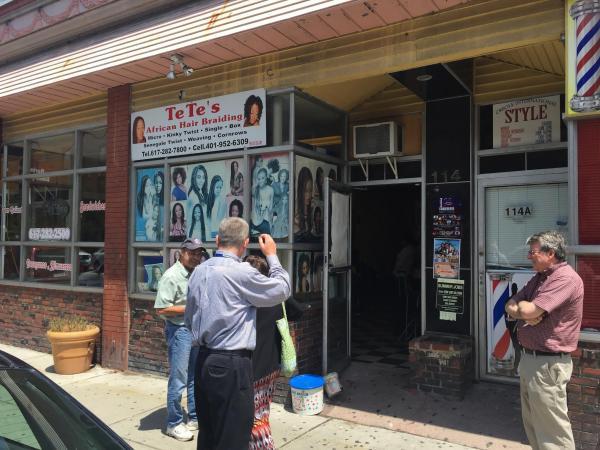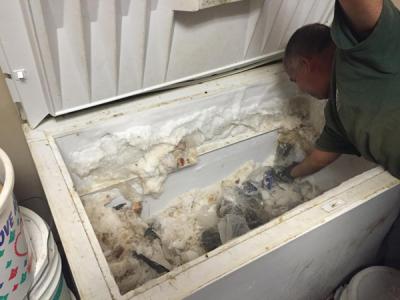July 21, 2016

City inspectors are shown outside TeTe’s African Hair Braiding on Stoughton Street.
Businesses and residents abutting 114B Stoughton St. may have had no idea what the strange packages entering and exiting the hair-braiding salon contained, but smoked fish likely would not have topped the guessing list.
Earlier this month, the city’s Inspectional Services Department cracked down on an illegal wholesale operation specializing in imported fish that was quietly running from the back of TeTe’s African Hair Braiding shop.
According to ISD Commissioner William Christopher, the department was contacted by Food and Drug Administration officials about an unlicensed fish distributor. Officials said a routine state health inspection in a Rhode Island market turned up a few food labels identifying 114B Stoughton St. as the point of origin for pieces of smoked fish.
Inspectors contacted the FDA, which contacted Massachusetts, which looped in ISD and the Boston Public Health Commission. The hair salon operating at that address was not an approved fish counter.
For even the most seasoned inspectors, this combination of storefront and hidden business was baffling. “[It’s a] total anomaly,” said Christopher. “As far as the world was concerned, this was an African hair braiding salon.”
According to Christopher, state inspectors on the scene inquired about the fish, and salon workers told them: “We know nothing about it.” Inspectors noticed a back door, which the store owner opened to reveal a room containing the illegal fish packed into coolers and refrigerators.
“It was a back room, very tiny. We could barely walk in there,” said John Meaney, assistant health commissioner with ISD, who went in after the initial inspection. The room, maybe 10 by 12 feet, housed “a huge cooler and two refrigerators packed, packed with smoked dried fish and something with a lettuce component,” Meaney said.
 Fish freezer: Inspectors say this container was used to store frozen fish.
Fish freezer: Inspectors say this container was used to store frozen fish.
It was a startling sight. The product in the room was unmarked, with no indication of where it had been smoked, Meaney said. Mouse droppings were found in the corners of the room and on the top of the refrigerators. Some of the materials in the room were so caked into their containers that inspectors had to chisel them away, Meaney said. “Pretty scary,” he added.
The operation was immediately shut down and all the fish destroyed, Christopher said. Inspectors wrote up the appropriate violations for the distribution section of the shop. State and federal health officials are investigating the fish trail, which inspectors were told may trace back to Africa.
TeTe’s salon remains closed for now, although the owners will have the opportunity to reopen after bringing the shop up to general commercial code, officials said. Braiding salons operate in a less-regulated mode than other hair salons, as their exclusive focus on braiding eliminates the need for special licensing or permitting.
Though no abutters had officially complained to the city about the salon, they said in conversations with inspectors that they had seen a number of packages entering and exiting the business.
Inspectional services depends on community reports and routine inspections to turn up illegal or unsafe conditions, Christopher said. “If people see things that they question,” he said, “you gotta let us know.”
Villages:
Topics:


